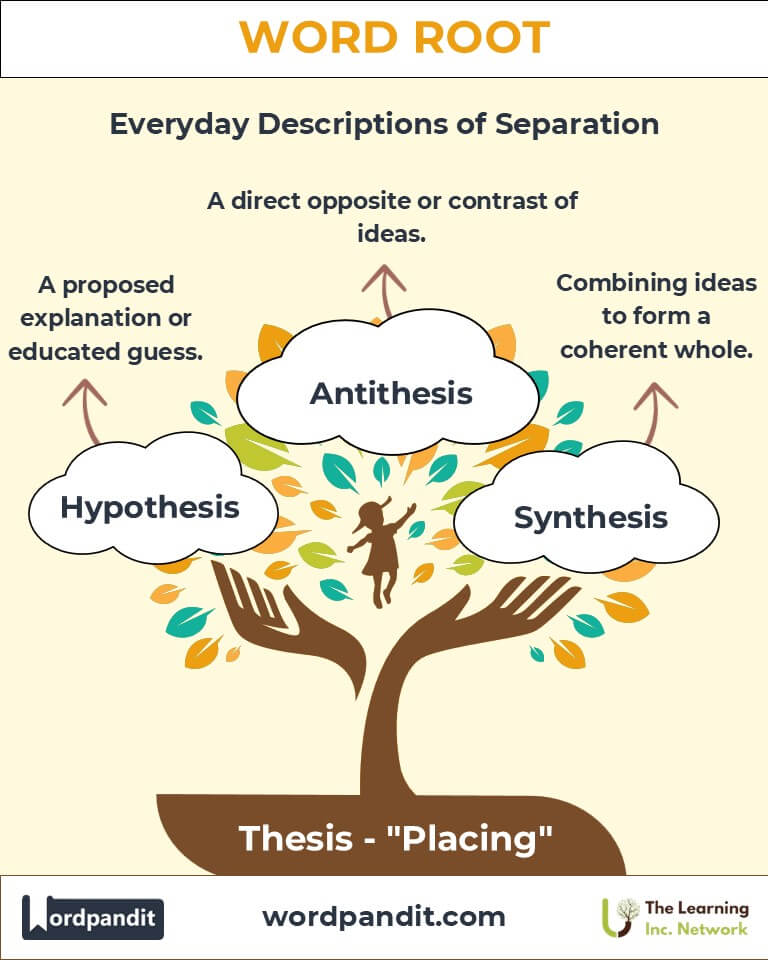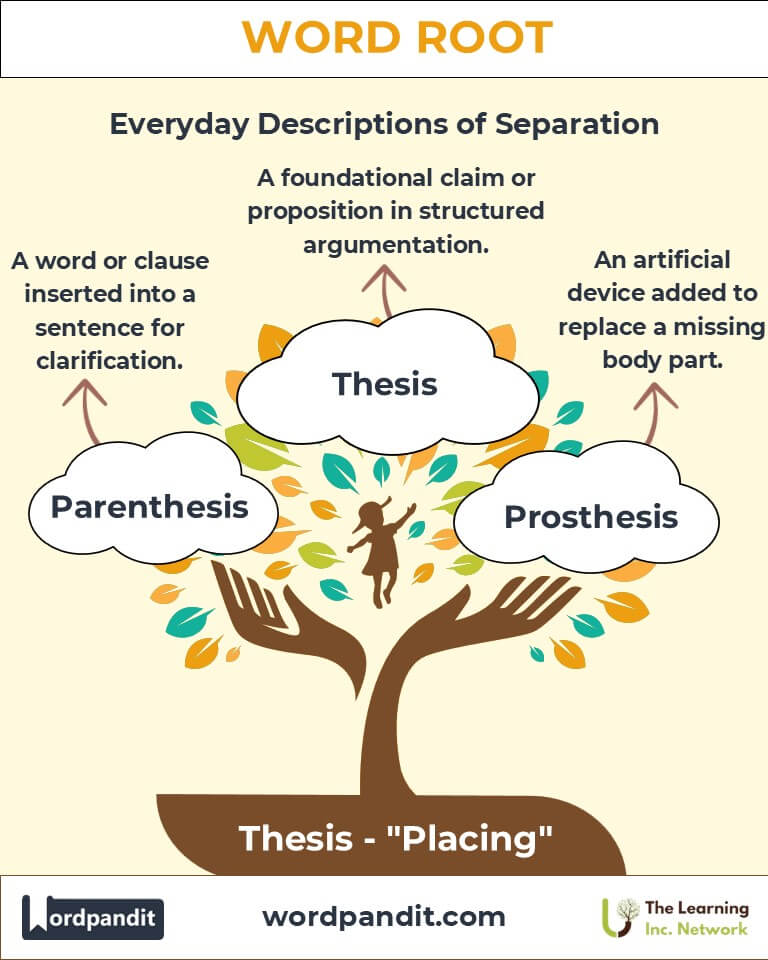Thesis: The Root of Placing and Position in Knowledge and Thought
Byline: Discover the linguistic power of the root "thesis," derived from the Greek word meaning "placing." From intellectual constructs like "hypothesis" to creative amalgamations such as "synthesis," this root forms the foundation of critical thinking, positioning, and structured argumentation in language, science, and philosophy.

Table of Contents
- Introduction: The Essence of "Thesis"
- Etymology and Historical Journey
- Mnemonic: Unlocking the Power of "Thesis"
- Common "Thesis"-Related Terms
- "Thesis" Through Time
- "Thesis" in Specialized Fields
- Illustrative Story: "Thesis" in Action
- Cultural Significance of the "Thesis" Root
- The "Thesis" Family Tree
- FAQs About the "Thesis" Word Root
- Test Your Knowledge: "Thesis" Word Root Quiz
- Conclusion: The Enduring Legacy of "Thesis"
1. Introduction: The Essence of "Thesis"
The word "thesis" (pronounced thee-sis) derives from the Greek root thesis, meaning "a placing" or "arrangement." In modern usage, it symbolizes the act of positioning ideas, arguments, or components into a coherent structure. Whether used in academic theses, where hypotheses are explored, or in processes like synthesis, "thesis" serves as the backbone of logical organization and intellectual exploration.

2. Etymology and Historical Journey
The root thesis stems from the Greek verb tithenai, meaning "to place" or "to set." In ancient Greece, it referred to the act of placing or proposing an idea. Philosophers like Aristotle used thesis to describe a proposition put forth for debate or consideration. Over time, its applications expanded into academic and scientific domains, symbolizing structured reasoning and argumentation.
3. Mnemonic: Unlocking the Power of "Thesis"
To remember "thesis," imagine arranging building blocks into a tower. Each block represents an idea or argument carefully placed to create a solid structure.
Mnemonic Device: "Thesis places ideas like blocks, building towers of thought and insight."
4. Common "Thesis"-Related Terms
- Hypothesis (hy-poth-uh-sis):
- Definition: A proposed explanation or educated guess.
- Example: "Her hypothesis about the effects of sleep deprivation guided the experiment."
- Synthesis (sin-thuh-sis):
- Definition: Combining ideas to form a coherent whole.
- Example: "The synthesis of data from various studies led to groundbreaking conclusions."
- Antithesis (an-tith-uh-sis):
- Definition: A direct opposite or contrast of ideas.
- Example: "His speech highlighted the antithesis between tradition and innovation."
- Parenthesis (puh-ren-thuh-sis):
- Definition: A word or clause inserted into a sentence for clarification.
- Example: "The explanation, placed in parenthesis, helped clarify the statement."
- Prosthesis (pros-thee-sis):
- Definition: An artificial device added to replace a missing body part.
- Example: "The new prosthesis allowed her to walk again with confidence."
5. "Thesis" Through Time
- Classical Usage: In Greek rhetoric, thesis denoted the proposition or point of debate in philosophical dialogues.
- Medieval Development: The term evolved to include academic writings where scholars presented structured arguments.
- Modern Applications: Today, it extends to scientific research, creative writing, and artificial intelligence, emphasizing placement and combination of ideas.
6. "Thesis" in Specialized Fields
- Philosophy:
- Thesis: A foundational claim or proposition in dialectical reasoning.
Example: "The philosopher's thesis challenged existing ethical norms."
- Thesis: A foundational claim or proposition in dialectical reasoning.
- Science:
- Hypothesis: Central to scientific methods, guiding experimentation.
Example: "The hypothesis about gravitational waves was later confirmed by observation."
- Hypothesis: Central to scientific methods, guiding experimentation.
- Medicine:
- Prosthesis: Refers to artificial replacements in medical contexts.
Example: "The dental prosthesis restored the patient's ability to chew."
- Prosthesis: Refers to artificial replacements in medical contexts.
- Literature and Linguistics:
- Parenthesis: Explains or adds supplementary information in texts.
Example: "The author's use of parenthesis added depth to the narrative."
- Parenthesis: Explains or adds supplementary information in texts.
7. Illustrative Story: "Thesis" in Action
Dr. Elena Rivera, a biologist, worked tirelessly to test her hypothesis on climate change's impact on migratory patterns. To communicate her findings, she synthesized data from diverse sources, crafting a compelling thesis. During her presentation, an antithesis emerged from a colleague questioning her assumptions. Undeterred, Elena incorporated the feedback, proving the robustness of her synthesis. This story exemplifies the dynamic power of "thesis" in fostering dialogue and discovery.
8. Cultural Significance of the "Thesis" Root
"Thesis" holds cultural significance as a cornerstone of intellectual and creative progress. In education, it represents the culmination of academic pursuits. Philosophically, it underscores humanity's quest for truth through structured argumentation. Its presence in everyday expressions—like hypotheses or synthetic ideas—reflects its enduring relevance.

9. The "Thesis" Family Tree
- Tithenai (Greek): To place or set.
- Hypothesis: Setting a foundation for reasoning.
Example: "Her hypothesis laid the groundwork for the study." - Prosthesis: Placing an artificial part.
Example: "Modern prostheses are highly functional and lifelike."
- Hypothesis: Setting a foundation for reasoning.
- Thesaurus (Greek): A storehouse or treasury of words.
- Example: "She used a thesaurus to expand her vocabulary."
- Synthetic (Greek): To combine or put together.
- Example: "Synthetic materials are engineered for specific uses."

10. FAQs About the Thesis Word Root
Q: What does "thesis" mean?
A: Thesis originates from the Greek word tithenai, meaning "to place" or "to set." It represents the act of positioning or arranging ideas, arguments, or objects. In modern contexts, it frequently refers to structured propositions, arguments, or academic works.
Q: How does "thesis" differ from "hypothesis"?
A: While both involve ideas or propositions, a thesis is a broader, more formal argument or statement of purpose, often serving as the central idea in academic or philosophical contexts. A hypothesis, on the other hand, is an educated guess or assumption that can be tested through experimentation or observation.
Q: What is synthesis, and how is it related to "thesis"?
A: Synthesis means "putting together" and involves combining elements to create a unified whole. It stems from the root thesis and represents the process of arranging multiple ideas or components into a cohesive framework, whether in scientific research, writing, or art.
Q: What does antithesis mean?
A: Antithesis refers to a direct contrast or opposition to an idea or statement. It often appears in rhetoric, literature, and philosophy to highlight conflicting viewpoints. For example, "freedom is the antithesis of oppression" uses antithesis to emphasize opposites.
Q: Why is the word "parenthesis" linked to "thesis"?
A: The term parenthesis comes from the Greek para (beside) and thesis (placing), literally meaning "placed beside." It refers to words, phrases, or clauses inserted into sentences to clarify or provide additional context.
Q: What is prosthesis, and how does it relate to the root "thesis"?
A: Prosthesis combines pros (in addition to) with thesis (placing), meaning "an addition or placement." It primarily refers to an artificial device replacing a missing body part, illustrating the root's meaning of positioning something.
Q: What role does "thesis" play in science?
A: In science, the root appears in terms like hypothesis and synthesis. A hypothesis serves as the starting point of an investigation, while synthesis often describes the process of combining data or findings into a comprehensive conclusion.
Q: Can "thesis" have creative or abstract uses?
A: Yes! In literature, philosophy, and art, thesis can signify a central theme or idea that guides a work or argument. For example, in debates, a thesis statement articulates the main point being defended.
Q: What is the significance of a thesis in academia?
A: In academic settings, a thesis is a detailed research document or dissertation, often written to fulfill the requirements of a degree. It involves proposing, defending, and justifying a scholarly argument or finding.
Q: Is "thesis" only about intellectual placement?
A: No. While commonly used in intellectual and abstract contexts, thesis also applies to physical and practical arrangements, such as in architecture or design, where elements are positioned to create balance and coherence.
11. Test Your Knowledge: Thesis Mastery Quiz
1. What does "thesis" mean?
2. Which term describes a combination of ideas?
3. What does "antithesis" signify?
4. Which field frequently uses "prosthesis"?
5. What is the role of a parenthesis in a sentence?
12. Conclusion: The Enduring Legacy of "Thesis"
The root "thesis" continues to shape our understanding of placement and structure in thought and expression. Its versatility enriches fields as diverse as science, philosophy, and linguistics, reminding us of the importance of positioning in the pursuit of knowledge. By exploring "thesis," we celebrate the enduring human quest to place ideas meaningfully within the world.












